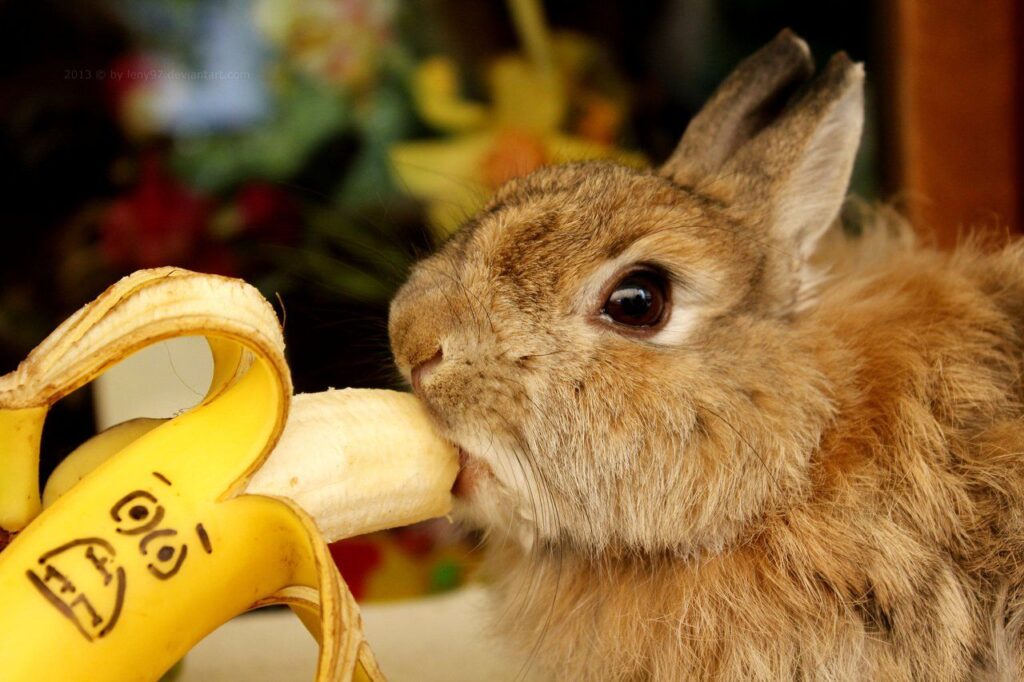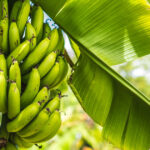As pet owners, we often enjoy sharing our snacks with our furry companions, and it’s natural to wonder if rabbits can join in on the fun. Bananas, with their sweet, tropical flavor, are a favorite treat for many humans, but can rabbits eat bananas safely? The answer is yes, but with some important guidelines to ensure their health and well-being.
In this article, we’ll explore whether bananas are a good snack for rabbits, the nutritional benefits they may offer, and how to safely incorporate them into your rabbit’s diet.
Can Rabbits Eat Bananas?
Rabbits can eat bananas, but they should be offered only in moderation. Bananas are not toxic to rabbits, so it’s safe to give them small amounts as an occasional treat. However, it’s important to remember that rabbits have delicate digestive systems, and their main diet should consist of hay, fresh vegetables, and a small amount of high-quality pellets. Bananas should never replace these essential food items.
Rabbits are herbivores and rely on fiber-rich foods to keep their digestive systems functioning properly. Fruits like bananas, while tasty, are higher in sugar and carbohydrates than the vegetables rabbits typically eat. If given too much fruit, including bananas, a rabbit could experience digestive upset, including diarrhea or obesity.
Nutritional Benefits of Bananas for Rabbits
While bananas should be given sparingly, they do offer some nutritional benefits when included in a balanced diet:
- Potassium: Bananas are rich in potassium, an essential mineral that supports muscle function, nerve transmission, and overall heart health. Potassium can be beneficial for rabbits in maintaining their overall health.
- Vitamins: Bananas contain a variety of vitamins, including vitamin C and vitamin B6, which help boost the immune system and support metabolism.
- Fiber: Although not as high in fiber as hay or leafy greens, bananas still contain some dietary fiber that can contribute to a rabbit’s digestive health.
That said, because of the sugar content, bananas should be considered an occasional treat rather than a staple part of your rabbit’s diet.
How Much Banana Should You Feed Your Rabbit?
Bananas should only be given as a small, occasional treat—about a few small slices, no more than once or twice a week. A small slice of banana, approximately 1-2 cm in width, is typically enough for a medium-sized rabbit. For smaller rabbits, even less is advisable.
Offering too much banana can lead to weight gain and digestive problems due to the high sugar and carbohydrate content. A general rule of thumb is that treats (including fruit) should make up no more than 10% of your rabbit’s daily diet.
If you’re introducing bananas to your rabbit for the first time, start with a very small amount to ensure they don’t have an adverse reaction. Some rabbits may have sensitive stomachs and might not tolerate fruit well.
The Risks of Overfeeding Bananas to Rabbits
While bananas are not toxic to rabbits, overfeeding them can lead to several health issues:
- Obesity: Bananas are relatively high in sugar and calories, and excessive consumption can contribute to weight gain in rabbits. Obesity is a serious issue in rabbits and can lead to a host of health problems, including arthritis and heart disease.
- Diarrhea and Digestive Upset: Rabbits have sensitive digestive systems that rely on a high-fiber diet to function properly. Too much sugar or carbohydrate-rich food, like bananas, can disrupt their gut flora and lead to diarrhea, bloating, or other digestive issues.
- Dental Problems: Like any sweet, soft treat, bananas can contribute to dental problems if fed too often. Too much fruit can increase the risk of dental decay and discomfort due to their sticky texture and sugar content.
How to Serve Bananas to Your Rabbit

If you decide to give your rabbit a banana treat, it’s essential to serve it properly. Here are some tips for feeding bananas to your rabbit safely:
- Peel the Banana: Always peel the banana before offering it to your rabbit. The peel can be difficult for rabbits to digest and could cause intestinal blockages.
- Cut into Small Pieces: Cut the banana into small, manageable pieces. This helps prevent overeating and makes it easier for your rabbit to nibble.
- Limit Frequency: As mentioned, bananas should only be offered once or twice a week, and only in small amounts.
- Fresh and Ripe: Make sure the banana is fresh and ripe, as unripe bananas can be harder for your rabbit to digest.
- Avoid Additives: Never give your rabbit bananas that have been processed, dried, or flavored with added sugars or preservatives. Stick to plain, fresh fruit.
Other Fruits Rabbits Can Eat
Bananas aren’t the only fruit that rabbits can enjoy in moderation. There are several other fruits that are safe for rabbits, though all should be given sparingly. Some good fruit options for rabbits include:
- Apples (without seeds)
- Pears
- Blueberries
- Strawberries
- Peaches (without the pit)
- Grapes (in moderation)
- Mango (without the pit)
Remember, when introducing any new fruit to your rabbit, it’s important to do so gradually and watch for any signs of digestive upset. Always remove any seeds or pits, as these can be toxic to rabbits or cause choking hazards.
Healthy Alternatives to Bananas
If you’re concerned about the sugar content of bananas or want to offer a healthier alternative, consider giving your rabbit more fiber-rich fruits and vegetables. Some excellent options include:
- Leafy greens: Romaine lettuce, kale, spinach (in moderation), and cilantro.
- Carrots: Rabbits love carrots, though they should be fed sparingly due to their high sugar content.
- Herbs: Basil, mint, and parsley make great, fresh alternatives.
Hay should remain the cornerstone of your rabbit’s diet, followed by fresh vegetables and a limited amount of pellets. Providing a variety of healthy, fiber-rich foods will ensure your rabbit stays in top shape.
Conclusion
In summary, rabbits can eat bananas, but only in small, controlled amounts. The sweet, tropical fruit offers some nutritional benefits, including potassium and vitamins, but should never replace a rabbit’s regular diet of hay and vegetables. Moderation is key to ensuring your rabbit stays healthy and doesn’t suffer from digestive issues, obesity, or other complications related to overfeeding sugary treats.
By offering bananas as an occasional treat and following safe serving practices, you can help your rabbit enjoy this sweet snack without compromising their health. Always consult with your veterinarian if you’re unsure about any part of your rabbit’s diet to ensure you’re providing the best care for your furry friend.



